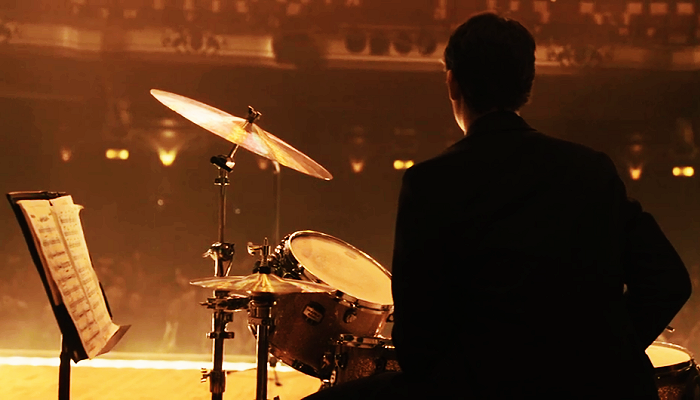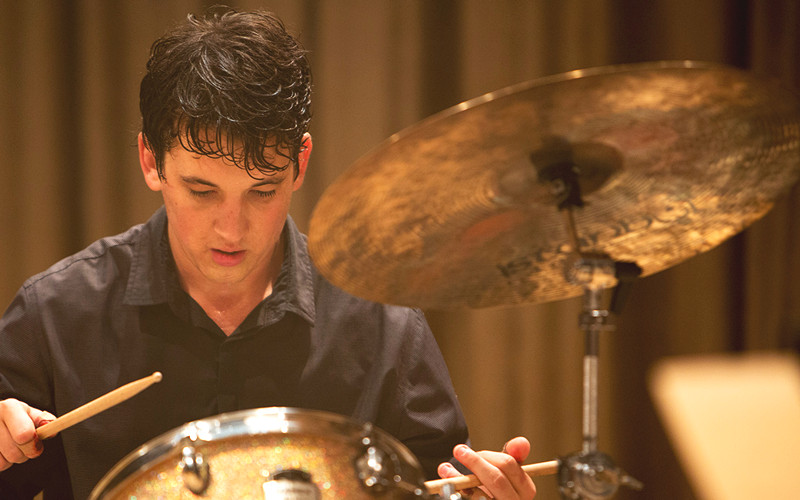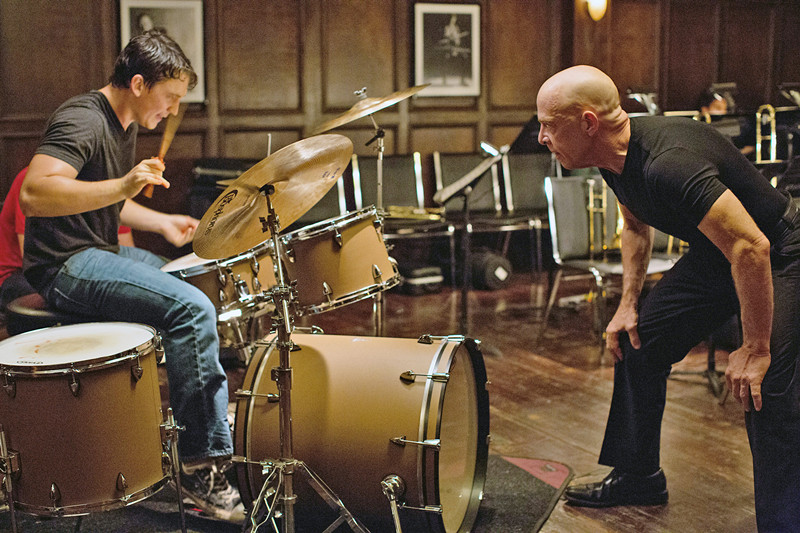
Are you one of those single tear people?
I saw Whiplash for the first time at the 2014 Vancouver International Film Festival, in a packed house with director Damien Chazelle in attendance. I’d heard rumblings of distant thunder about the film earlier that year when it took Sundance by storm, and where it was dubbed “Full Metal Jacket at Julliard’ by juiced up fans.
The premise, about a jazz drummer in a prestigious music academy rehashing the ol’ student/mentor maxim didn’t strike me as novel or this season’s anything. And then I saw the film, expecting the old underdog sports formula, a reiteration of The Damned United or maybe The Karate Kid and that wasn’t what I got at all. What I got was passionately and restlessly reminded of the promise and potential of cinema.
Whiplash is an emotional thriller shrewdly covered as a jazz opera, offering some of the biggest kicks and starts to roll out in a mainstream movie house in some time.
The sophomore film from Damien Chazelle, whose forthcoming ode to the Hollywood studio musical La La Land is already the early-buzz frontrunner for 2017’s Oscar race, Whiplash comes after 2009’s jazz-infused micro budget musical Guy and Madeline on a Park Bench, and doubles as a courageous confessional, of sorts.
Chazelle was a dedicated jazz drummer himself, in a conservatory-style orchestra as a teen, and the nerve-shattering misgivings and constant fear he felt there, specifically the performance anxiety and the highly combative state of affairs at school is what forced his unbending understanding and his bold vision. In Whiplash the practice studio is a terrifying theater of war.
“Whether Whiplash tells us much about music, despite a fine rendition of Duke Ellington’s ‘Caravan,’ I’m not sure. It’s more about power than it is about jazz, and the fetishistic closeups—of blood and flying sweat, as well as of tears—suggest a blend of boot camp, football coaching, and pornography.”
– Anthony Lane, The New Yorker
Advanced techniques for the modern drummer

Set in an esteemed and antagonistic east coast music conservatory, Andrew Nyman (Miles Teller, exceptional) is a high-reaching and determined jazz drummer who wants to be nonpareil. Encouraged by his father, a struggling writer, played with smarts by Paul Reiser, whom Andrew is close to but apologetic about, seeing his failure as a writer as a cloud that could similarly darken his own pursuits. Maybe this fear isn’t rational, but most fears are just that, irrational and a little off-the-wall.
Enter an Oscar-winning performance from J.K. Simmons as Terence Fletcher, the merciless teacher whose modus operandi of strong-arming his students is dubious and disgraceful. “Barker,” he sneers at a student during a session in the practice studio, “that is not your boyfriend’s dick, do not come early.” He’s nothing like Pat Morita’s judicious Mr. Miyagi, he’s more analogous to R. Lee Emery’s foul-mouthed and fouler-tempered Gunnery Sergeant Hartman of Full Metal Jacket infamy.
Fletcher’s humiliation, his verbal and physical intimidation––he regularly lobs furniture at his students––even though it seems to get results, is as culpable as it is monstrous, and when Andrew becomes his star pupil, the shit gets real. Fletcher, as bête noire, makes for some of the most nerve-racking and overwrought episodes in the film, intensifying as the story unfolds.
Bleed like me

Tim Cross’ editing is deft and masterful, not only keeping tempo with the mental offensive maneuvers between Andrew and Fletcher—who is incredibly abusive, physically and psychically—but also matching the variegated jazz rhythms of the music, generating suspense that masters like Hitchcock, De Palma, Frankenheimer, and Friedkin would extol and acknowledge.
Like Popeye Doyle’s daredevil car chase in The French Connection, Chazelle has dreamt up frenzied, dizzying sequences where Andrew’s pursuit of perfection, seated at the drum kit, either grabs the audience by the throat or throws them for a loop, addled and always in awe.
There’s no shortage of recognizable content and longshot shibboleth in Whiplash, it does, to a degree, follow convention, but it startles said conventions with speed. For instance, the requisite love interest, Nicole, played by Melissa Benoist of Glee fame, hangs by the proverbial thread but serves a different purpose to the story, one more character driven than goal oriented.
And the third act climax of the film, well, it’s something else altogether, in turns tender, cold-blooded, devastating, exuberant, and exhausting. It’s the kind of closer you lag away from, apple-polishing, and utterly astonished.
“Unlike a lot of things in the script, the ending was there from the beginning. I always had a rough sense of where the movie was heading… It had to end in this spectacular way: that Andrew may be triumphant, but if you look at it more closely, it’s fucked up and tragic.”
– Damien Chazelle
Bang the drum slowly

There’s certainly some introspection intended for the audience as the perfection pursuance angle comes across as ugly and curt, also Charlie Parker fans may malinger on an anecdote that gets frequently implied and isn’t historically accurate, it just better serves the story.
The missive here, and the moral ambiguity, esteems an intelligent audience, one who can make their own precepts and opinions from what has played out with its experiential artists and hard-hearted scholars. For all its variations, tongue-lashings, and intensity, Whiplash requires recovery time, as its pains will persist for quite a stretch afterwards, ensuring it as some kind of classic.
Author Bio: Shane Scott-Travis is a film critic, screenwriter, comic book author/illustrator and cineaste. Currently residing in Vancouver, Canada, Shane can often be found at the cinema, the dog park, or off in a corner someplace, paraphrasing Groucho Marx. Follow Shane on Twitter @ShaneScottravis.